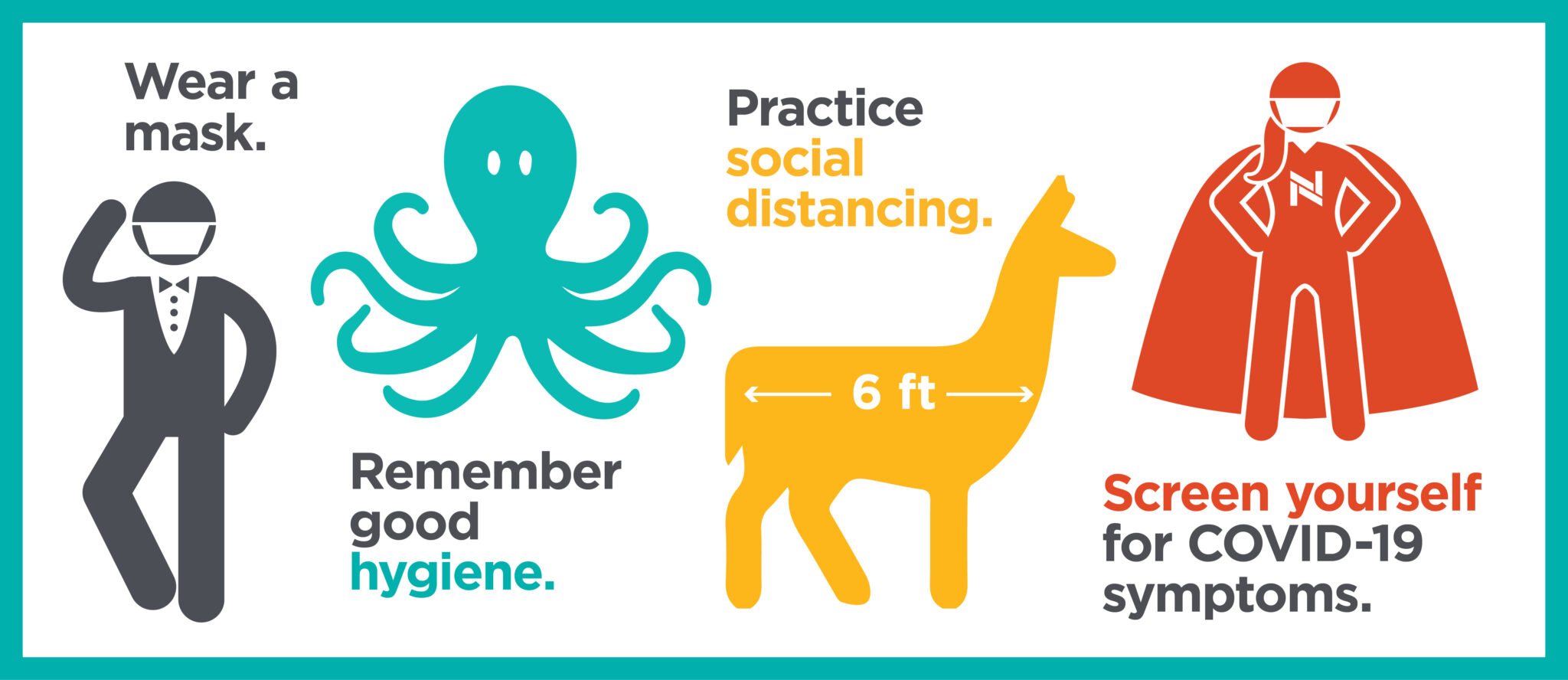
As we move forward in the time of COVID-19, we’re being asked to incorporate new habits into our everyday routines as a way to keep our ourselves, our loved ones and our community safer and healthier. These habits are critical in helping slow the spread of infection in our communities, particularly as schools re-open and many students return to the classroom, either full-time or in a hybrid learning environment.
At North Memorial Health the wellness and safety of our patients and our team members has always been a top priority, so these practices are second nature for us. It’s up to all of us to do our part to ensure a safer environment everywhere, not just at the hospital or clinic but in our schools, our stores, our places of business and anywhere we may gather. To help us understand how to do just that, we’ve asked The Good Doctor – Dr. J. Kevin Croston, CEO of North Memorial Health – to explain how to apply four key practices – what we call the Four Pillars of Safety – to our personal lives.
Simple Steps You Can Take to Stop the Spread
At North Memorial Health the safety pillars are key guidelines that help us keep our patients and team members safer. However, they’re also good habits to incorporate as individuals to prevent the spread of COVID-19 as well as the flu and other contagious diseases. “But we can’t just look at each of these things as separate activities,” says Dr. Croston. “We need to understand how masks, social distancing, good hygiene, and health screenings work together to keep us safe and well. “In other words, Dr. Croston says, we have to combine all four into our ongoing routine.
Pillar #1: Wear a Mask
It goes without saying that we’ve worn masks during hospital procedures for a long time. As of July 25th, people in Minnesota are required to wear a face covering in all indoor businesses and public indoor spaces. Dr. Croston wrote about the do’s and don’ts of wearing a mask, prior to our state’s mask mandate and it bears repeating that experts including the CDC recommend masks and cloth face coverings to help protect from spreading the virus to others when you’re not showing symptoms (asymptomatic) or before showing symptoms (pre-symptomatic). “When everyone wears a mask, we reduce the risk of infection from COVID-19 exponentially. As we know, masks protect other people even more than yourself,” Dr. Croston says. “But masks are an added precaution. They need to be combined with other safety measures, like social distancing, to be as effective as possible.”
Pillar #2: Practice Social Distancing
Croston and most healthcare experts define proper social distancing as staying at least six feet away from other people. “That’s about two arms’ length from others at a minimum, or we like to refer to it as the length of a full-size llama” he says. “We know that COVID-19 is mainly spread through respiratory droplets when you’re near someone for an extended period, and closer than about six feet.” Masks plus social distancing, he adds, help create a stronger barrier to reduce the chance of giving the virus to others. North Memorial Health has taken steps across our locations to enable social distancing including one-way flow of traffic in our clinics, floor clings designating six feet apart and the removal and spacing of chairs to ensure people can properly distance.
Pillar #3: Remember Good Hygiene
Next up, don’t forget about good hygiene, which includes making a habit of washing your hands often and thoroughly. It also means cleaning high traffic or “high touch” areas like countertops, appliances and door handles. “Washing your hands for at least 20 seconds is one of the best ways to prevent the spread of infection,” Dr. Croston says. “Pay attention to key times when handwashing is particularly important, such as when preparing food, after using the restroom, or after blowing your nose, coughing or sneezing.” He reminds us also to wash our hands before and after caring for someone at home who is sick.
Pilar #4: Screen Yourself for COVID-19 Symptoms
Last but not least, the Good Doctor reminds us that “it’s common practice at every North Memorial Health location to screen patients for symptoms of COVID-19,” adding that “making sure you’re doing your own health screening on a daily basis is also a good personal, safer routine.” Be aware of symptoms you may be having and if you are not feeling well, stay in your home unless you need to seek medical care. To conduct a personal health screening, you should ask yourself the following questions:
- Do I have a fever of 100 degrees Fahrenheit or higher?
- If there is no fever, do I have two or more of the following symptoms:
- Cough
- Sore Throat
- Headache
- Shortness of breath
- New loss of taste or smell
- Muscle or body aches
- Nausea, vomiting or diarrhea
- Fatigue
- Congestion or runny nose
Being aware of the above symptoms can help us determine if we might be at risk of having COVID-19. Dr. Croston says that if the answer to either of the questions above is yes, it’s important to consult your doctor to find out if should be tested for COVID-19. Remember, North Memorial Health has both drive-through and walk-in test sites that are fast, convenient and accurate.
The Good Doctor recommends that we all incorporate these safer practices into a daily routine to help keep our families and our communities safer and healthier, and to stop the spread of COVID-19. So, remember:
- Wear a mask.
- Practice social distancing.
- Remember good hygiene.
- Screen yourself for COVID-19 symptoms.

